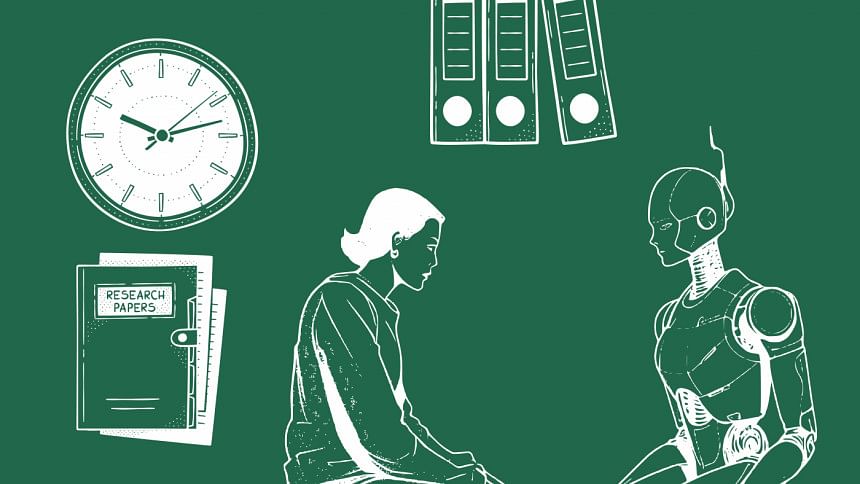Should you use AI in your university courses?

In most Bangladeshi universities nowadays, an unusual sight can be seen which was foreign even a decade ago: students huddled over their laptops, engrossed in their screens. It's as if our screens have replaced traditional textbooks and notebooks. And now, they're equipped with an invisible but powerful tool: Artificial Intelligence (AI). AI has been a hot topic in education for years, but the conversation has taken on a new urgency as AI tools become more sophisticated and accessible. Students can now use AI in various ways, from ChatGPT to help them write essays to Tome.ai to help them make presentation slides.
This remarkable level of accessibility and proficiency exhibited by AI tools has rendered them an omnipresent fixture in virtually all conceivable fields. With that arises the question that has educators, students, and tech enthusiasts engaged in vigorous debates: should university students use AI in their courses?
An invisible ally
Ishika, a first-year finance student at BUP and fintech enthusiast, is one of the many who have embraced AI. "I use AI tools to help me with my essays or correct my coding," he says. "It helps me brainstorm ideas, check my grammar, and suggest edits. It's like having a personal tutor."
Ishika is not alone. A recent study conducted by EduCause found that over 60% of university students have used an AI tool in their coursework in the past year. The use of AI is not limited to writing; students are also using it for problem-solving in fields like Physics, Mathematics, and Engineering.
And this is not a sentiment exclusive to students. Md. Nafizur Rahman, a lecturer in Finance at Bangladesh University of Professionals (BUP), extols the virtues of AI in academia: "AI can help bridge gaps in learning by identifying areas where a student is struggling and providing customised resources to help improve. It's not about replacing human interaction but enhancing it through a more personalised approach."
By leveraging these capabilities, educators can infuse their teaching materials with fresh perspectives and cutting-edge information. AI-assisted content creation enables instructors to stay at the forefront of their fields, constantly updating their course materials to reflect the latest advancements and discoveries. With the help of students, educators can promote teamwork, creativity, and effective collaboration by utilising the potential of AI technology.
The double-edged sword
Yet, the integration of AI into education is not without its critics. Like any technological advancement, AI can be both a blessing and a curse. Concerns about data privacy, the digital divide, inaccurate information, and the loss of human touch in education are frequently cited. Some argue that reliance on AI might hamper the development of critical thinking and problem-solving skills, as the machine does most of the heavy lifting.
Even faculty members who support the integration of AI, such as Nafizur Rahman, added, "Universities serve as a foundation for personal development. While AI can bring about advancements and enhance performance, it has the potential to impede our analytical skills alongside our ability to conceptualise."
But perhaps the biggest concern is that in a rush to embrace AI in academia, we risk losing the essence of personal connection and warmth at the heart of education. Traditional classroom learning is not merely an information transfer; it's a rich tapestry of interactions, discussions, and shared experiences. It's also about learning empathy, comprehending diverse viewpoints, developing social skills, and effectively expressing oneself through eloquent writing. These are elements that an AI, however advanced, might be unable to replicate.
Dr Ziaur Rahman, an associate professor at Bangladesh University of Professionals, highlights another concern: losing the human touch in education. He says, "While AI can certainly aid in learning, it's essential not to lose sight of the human element. Education is not just about information absorption or calculations." He further questions, "When it comes to helping with calculations, an AI tool can be optimal, but will it be able to offer the human touch regarding writing?"
The automation of grading and feedback by AI systems is another contentious issue. While it may offer efficiencies, critics argue it can't match human educators' nuanced understanding and feedback. Even though Bangladesh currently is far from this worry, the responsibility of grading efficiently and properly lies on the shoulders of our faculties.
A question of equity
Not all students have equal access to technology, and using AI in courses could inadvertently widen the digital divide, further disadvantaging students from underprivileged backgrounds.
When talking with Md. Nafizur Rahman, he voiced his concern: "As much as I love technology and AI, I think Bangladesh is far from being able to embrace it due to the digital divide." His words highlight a shared concern among educators about the need to ensure all students have equal opportunities to benefit from integrating AI in the classroom. He also added that while AI has the potential to enhance learning experiences, the transition should be made thoughtfully, with a keen eye on equity. For Bangladesh, that might take the next 10-15 years.
Striking a balance with AI in education
Despite these concerns, it's undeniable that AI is here to stay. As such, it's essential for universities to strike a balance, integrating AI into their courses in a way that enhances learning, supports student success, and ensures ethical standards.
To achieve this balance, universities must approach the integration of AI with an educator and student-centric lens. Instead of adopting technology for technology's sake, decisions should be guided by the question: "How does this serve our students, and can our educators handle it properly?" This involves ensuring that AI tools complement traditional teaching methods rather than replace them.
Beyond the classroom
Moreover, equipping students with AI skills and literacy is no longer a luxury but a necessity. As industries increasingly adopt AI, graduates entering the job market will be expected to have a basic understanding of AI, regardless of their field of study.
As industries increasingly adopt AI, graduates entering the job market will be expected to have a basic understanding of AI, regardless of their field of study. This understanding isn't simply about knowing how to use AI tools or about being able to code. It's about understanding the ethical implications of AI, its societal impacts, and its limitations.
Concerning this particular subject, Md. Nafizur Rahman articulated, "Our role as educators isn't just to prepare students for the job market; it's to prepare them to be ethical, thoughtful contributors. It is important to educate students that while AI can be a helpful tool in academia, they must also uphold ethical standards." Universities are uniquely positioned to foster this understanding. And educators have to be the ones to take charge of this enhancement in learning.
Navigating the AI revolution in higher education
As the debate rages on, one thing is clear: AI's role in higher education is a complex issue that requires careful consideration and discussion among educators, students, and policy-makers.
As we navigate this AI revolution, it's crucial to remember that technology should serve as a tool to enhance human potential, not replace it. With the right approach and a well-rounded sense of responsibility, AI can be a powerful ally in our quest for knowledge, innovation, and progress.

 For all latest news, follow The Daily Star's Google News channel.
For all latest news, follow The Daily Star's Google News channel. 








Comments